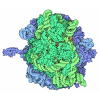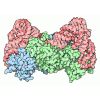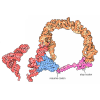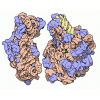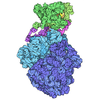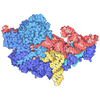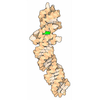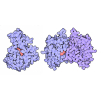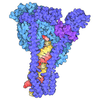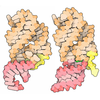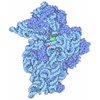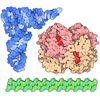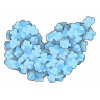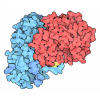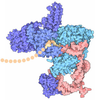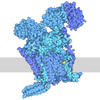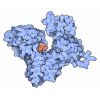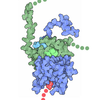[English] 日本語
 Yorodumi
Yorodumi- PDB-3j0l: Core of mammalian 80S pre-ribosome in complex with tRNAs fitted t... -
+ Open data
Open data
- Basic information
Basic information
| Entry | Database: PDB / ID: 3j0l | ||||||
|---|---|---|---|---|---|---|---|
| Title | Core of mammalian 80S pre-ribosome in complex with tRNAs fitted to a 9.8A cryo-EM map: classic PRE state 1 | ||||||
 Components Components |
| ||||||
 Keywords Keywords | RIBOSOME / Mammalia / translation / elongation cycle / tRNA | ||||||
| Function / homology | RNA / RNA (> 10) / RNA (> 100) Function and homology information Function and homology information | ||||||
| Biological species |  | ||||||
| Method | ELECTRON MICROSCOPY / single particle reconstruction / cryo EM / Resolution: 9.8 Å | ||||||
 Authors Authors | Budkevich, T. / Giesebrecht, J. / Altman, R. / Munro, J. / Mielke, T. / Nierhaus, K. / Blanchard, S. / Spahn, C.M. | ||||||
 Citation Citation |  Journal: Mol Cell / Year: 2011 Journal: Mol Cell / Year: 2011Title: Structure and dynamics of the mammalian ribosomal pretranslocation complex. Authors: Tatyana Budkevich / Jan Giesebrecht / Roger B Altman / James B Munro / Thorsten Mielke / Knud H Nierhaus / Scott C Blanchard / Christian M T Spahn /  Abstract: Although the structural core of the ribosome is conserved in all kingdoms of life, eukaryotic ribosomes are significantly larger and more complex than their bacterial counterparts. The extent to ...Although the structural core of the ribosome is conserved in all kingdoms of life, eukaryotic ribosomes are significantly larger and more complex than their bacterial counterparts. The extent to which these differences influence the molecular mechanism of translation remains elusive. Multiparticle cryo-electron microscopy and single-molecule FRET investigations of the mammalian pretranslocation complex reveal spontaneous, large-scale conformational changes, including an intersubunit rotation of the ribosomal subunits. Through structurally related processes, tRNA substrates oscillate between classical and at least two distinct hybrid configurations facilitated by localized changes in their L-shaped fold. Hybrid states are favored within the mammalian complex. However, classical tRNA positions can be restored by tRNA binding to the E site or by the eukaryotic-specific antibiotic and translocation inhibitor cycloheximide. These findings reveal critical distinctions in the structural and energetic features of bacterial and mammalian ribosomes, providing a mechanistic basis for divergent translation regulation strategies and species-specific antibiotic action. | ||||||
| History |
|
- Structure visualization
Structure visualization
| Movie |
 Movie viewer Movie viewer |
|---|---|
| Structure viewer | Molecule:  Molmil Molmil Jmol/JSmol Jmol/JSmol |
- Downloads & links
Downloads & links
- Download
Download
| PDBx/mmCIF format |  3j0l.cif.gz 3j0l.cif.gz | 625.2 KB | Display |  PDBx/mmCIF format PDBx/mmCIF format |
|---|---|---|---|---|
| PDB format |  pdb3j0l.ent.gz pdb3j0l.ent.gz | 471.1 KB | Display |  PDB format PDB format |
| PDBx/mmJSON format |  3j0l.json.gz 3j0l.json.gz | Tree view |  PDBx/mmJSON format PDBx/mmJSON format | |
| Others |  Other downloads Other downloads |
-Validation report
| Summary document |  3j0l_validation.pdf.gz 3j0l_validation.pdf.gz | 940 KB | Display |  wwPDB validaton report wwPDB validaton report |
|---|---|---|---|---|
| Full document |  3j0l_full_validation.pdf.gz 3j0l_full_validation.pdf.gz | 996.4 KB | Display | |
| Data in XML |  3j0l_validation.xml.gz 3j0l_validation.xml.gz | 47.5 KB | Display | |
| Data in CIF |  3j0l_validation.cif.gz 3j0l_validation.cif.gz | 81.3 KB | Display | |
| Arichive directory |  https://data.pdbj.org/pub/pdb/validation_reports/j0/3j0l https://data.pdbj.org/pub/pdb/validation_reports/j0/3j0l ftp://data.pdbj.org/pub/pdb/validation_reports/j0/3j0l ftp://data.pdbj.org/pub/pdb/validation_reports/j0/3j0l | HTTPS FTP |
-Related structure data
| Related structure data |  5326MC  5327C  5328C  5329C  3j0oC  3j0pC  3j0qC M: map data used to model this data C: citing same article ( |
|---|---|
| Similar structure data |
- Links
Links
- Assembly
Assembly
| Deposited unit | 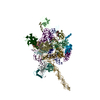
|
|---|---|
| 1 |
|
- Components
Components
-40S ribosomal RNA ... , 10 types, 10 molecules abcdeEfgGh
| #1: RNA chain | Mass: 15500.287 Da / Num. of mol.: 1 / Source method: isolated from a natural source / Source: (natural)  |
|---|---|
| #2: RNA chain | Mass: 3876.367 Da / Num. of mol.: 1 / Source method: isolated from a natural source / Source: (natural)  |
| #3: RNA chain | Mass: 5426.301 Da / Num. of mol.: 1 / Source method: isolated from a natural source / Source: (natural)  |
| #4: RNA chain | Mass: 2283.459 Da / Num. of mol.: 1 / Source method: isolated from a natural source / Source: (natural)  |
| #5: RNA chain | Mass: 1223.818 Da / Num. of mol.: 1 / Source method: isolated from a natural source / Source: (natural)  |
| #6: RNA chain | Mass: 1482.920 Da / Num. of mol.: 1 / Source method: isolated from a natural source / Source: (natural)  |
| #7: RNA chain | Mass: 6794.028 Da / Num. of mol.: 1 / Source method: isolated from a natural source / Source: (natural)  |
| #8: RNA chain | Mass: 9934.950 Da / Num. of mol.: 1 / Source method: isolated from a natural source / Source: (natural)  |
| #9: RNA chain | Mass: 4132.518 Da / Num. of mol.: 1 / Source method: isolated from a natural source / Source: (natural)  |
| #10: RNA chain | Mass: 35735.312 Da / Num. of mol.: 1 / Source method: isolated from a natural source / Source: (natural)  |
-Ribosomal protein ... , 8 types, 8 molecules TKLXSBJF
| #11: Protein | Mass: 21662.209 Da / Num. of mol.: 1 / Source method: isolated from a natural source / Source: (natural)  |
|---|---|
| #12: Protein | Mass: 15218.456 Da / Num. of mol.: 1 / Source method: isolated from a natural source / Source: (natural)  |
| #13: Protein | Mass: 15646.519 Da / Num. of mol.: 1 / Source method: isolated from a natural source / Source: (natural)  |
| #14: Protein | Mass: 7893.379 Da / Num. of mol.: 1 / Source method: isolated from a natural source / Source: (natural)  |
| #15: Protein | Mass: 14027.381 Da / Num. of mol.: 1 / Source method: isolated from a natural source / Source: (natural)  |
| #24: Protein | Mass: 24014.168 Da / Num. of mol.: 1 / Source method: isolated from a natural source / Source: (natural)  |
| #25: Protein | Mass: 25208.191 Da / Num. of mol.: 1 / Source method: isolated from a natural source / Source: (natural)  |
| #26: Protein | Mass: 10955.075 Da / Num. of mol.: 1 / Source method: isolated from a natural source / Source: (natural)  |
-60S ribosomal RNA ... , 8 types, 8 molecules 12345678
| #16: RNA chain | Mass: 16044.528 Da / Num. of mol.: 1 / Source method: isolated from a natural source / Source: (natural)  |
|---|---|
| #17: RNA chain | Mass: 36097.496 Da / Num. of mol.: 1 / Source method: isolated from a natural source / Source: (natural)  |
| #18: RNA chain | Mass: 3859.384 Da / Num. of mol.: 1 / Source method: isolated from a natural source / Source: (natural)  |
| #19: RNA chain | Mass: 4572.787 Da / Num. of mol.: 1 / Source method: isolated from a natural source / Source: (natural)  |
| #20: RNA chain | Mass: 1875.189 Da / Num. of mol.: 1 / Source method: isolated from a natural source / Source: (natural)  |
| #21: RNA chain | Mass: 6218.866 Da / Num. of mol.: 1 / Source method: isolated from a natural source / Source: (natural)  |
| #22: RNA chain | Mass: 15929.329 Da / Num. of mol.: 1 / Source method: isolated from a natural source / Source: (natural)  |
| #23: RNA chain | Mass: 6462.904 Da / Num. of mol.: 1 / Source method: isolated from a natural source / Source: (natural)  |
-RNA chain , 3 types, 6 molecules YVWyvw
| #27: RNA chain | Mass: 24485.539 Da / Num. of mol.: 3 / Source method: isolated from a natural source / Source: (natural)  #28: RNA chain | Mass: 872.556 Da / Num. of mol.: 2 / Source method: isolated from a natural source / Source: (natural)  #29: RNA chain | | Mass: 613.454 Da / Num. of mol.: 1 / Source method: isolated from a natural source / Source: (natural)  |
|---|
-Details
| Sequence details | ENTRY HAS BEEN MODELED WITH 60S RIBOSOMAL RNA AND PROTEINS FROM SACCHAROMYCES CEREVISIAE, 40S ...ENTRY HAS BEEN MODELED WITH 60S RIBOSOMAL RNA AND PROTEINS FROM SACCHAROMY |
|---|
-Experimental details
-Experiment
| Experiment | Method: ELECTRON MICROSCOPY |
|---|---|
| EM experiment | Aggregation state: PARTICLE / 3D reconstruction method: single particle reconstruction |
- Sample preparation
Sample preparation
| Component | Name: CORE OF MAMMALIAN 80S PRE-RIBOSOME IN COMPLEX WITH TRNAS Type: RIBOSOME |
|---|---|
| Buffer solution | Name: polyamine buffer / pH: 7.5 / Details: polyamine buffer |
| Specimen | Embedding applied: NO / Shadowing applied: NO / Staining applied: NO / Vitrification applied: YES |
| Specimen support | Details: Carbon coated Quantifoil grids |
| Vitrification | Instrument: FEI VITROBOT MARK I / Cryogen name: ETHANE Details: Ethane / Vitrobot (FEI) flash-frozen in liquid ethane |
- Electron microscopy imaging
Electron microscopy imaging
| Experimental equipment | 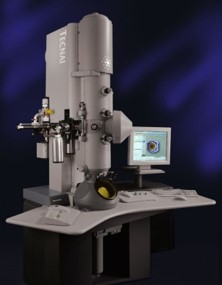 Model: Tecnai Polara / Image courtesy: FEI Company |
|---|---|
| Microscopy | Model: FEI POLARA 300 / Date: Oct 17, 2006 |
| Electron gun | Electron source:  FIELD EMISSION GUN / Accelerating voltage: 300 kV / Illumination mode: FLOOD BEAM FIELD EMISSION GUN / Accelerating voltage: 300 kV / Illumination mode: FLOOD BEAM |
| Electron lens | Mode: BRIGHT FIELD / Nominal magnification: 39000 X / Calibrated magnification: 65520 X / Nominal defocus max: 4000 nm / Nominal defocus min: 2000 nm / Cs: 2 mm |
| Specimen holder | Temperature: 77 K |
| Image recording | Electron dose: 20 e/Å2 / Film or detector model: KODAK SO-163 FILM |
- Processing
Processing
| EM software |
| ||||||||||||||||||||
|---|---|---|---|---|---|---|---|---|---|---|---|---|---|---|---|---|---|---|---|---|---|
| CTF correction | Details: CTF CORRECTION OF EACH DEFOCUS GROUP VOLUME PRIOR TO BACK PROJECTION | ||||||||||||||||||||
| Symmetry | Point symmetry: C1 (asymmetric) | ||||||||||||||||||||
| 3D reconstruction | Method: PROJECTION MATCHING / SPIDER / Resolution: 9.8 Å / Num. of particles: 30448 / Nominal pixel size: 2.52 Å / Actual pixel size: 2.52 Å / Symmetry type: POINT | ||||||||||||||||||||
| Atomic model building |
| ||||||||||||||||||||
| Atomic model building | 3D fitting-ID: 1 / Source name: PDB / Type: experimental model
| ||||||||||||||||||||
| Refinement step | Cycle: LAST
|
 Movie
Movie Controller
Controller


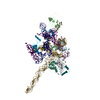




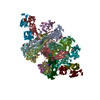
 PDBj
PDBj